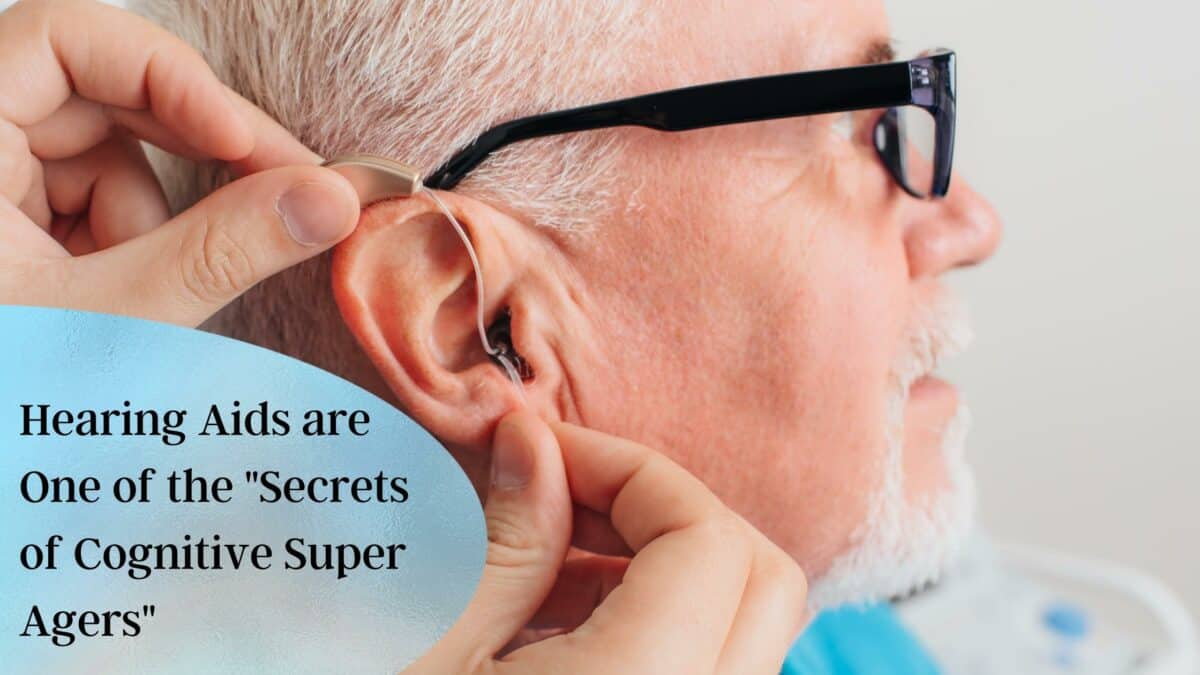Not many people live to and beyond age 100. In fact, less than 1% of people in the U.S. live until 100. But more studies show that people who do tend to possess the cognitive healthiness of someone who is decades younger. Researchers have labeled this population cognitive superagers: older adults, 70 years and older, who have the mental and physical capacities of a person much younger. Newer studies show that the small percentage of people who live to be 100 still live healthy lives. Researchers are increasingly interested in identifying the qualities that contribute to this longevity and healthiness of the mind and body. One characteristic they’ve established is healthy hearing supported by hearing aids.
Studying Cognitive Super Agers
As more research focuses on centenarians (people 100 and beyond), there are emerging patterns of various factors that contribute to aging well. One recent study that illuminated characteristics of cognitive super-agers was conjured by researchers at Vrije University in Amsterdam. Published in the American Medical Association’s journal JAMA Network, the study included 330 centenarians. These participants had their cognitive abilities thoroughly evaluated yearly over a 4 year period. Data from these tests highlighted that:
- cognitive functions like decision making and completing tasks were strong.
- cognitive performance remained high while this age group experienced an increased risk of experiencing cognitive decline and related conditions like Alzheimer’s.
This highlights that cognitive superagers remain cognitively resilient despite the increased risk of cognitive decline. Researchers suggest that what makes cognitive superagers healthy is having a cognitive reserve. This reserve allows a person to adapt to changes that the brain could experience over time which expands capacity to slow the aging process.
Additional traits of cognitive super-agers also include: maintaining a balanced and healthy diet, higher levels of social engagement, participation in hobbies, exercising consistently, as well as professions that are cognitively demanding. Cognitive super-agers also tend to have healthy vision and hearing health. This highlights the importance of hearing health in maintaining overall health and wellness.
Link Between Hearing Loss & Cognitive Decline
Hearing loss impacts brain health in a variety of ways which can lead to decline. Extensive research shows that untreated hearing loss increases the risk of cognitive decline and the development of dementia. This includes a study published in the Journal of the Alzheimer’s Association which explored this correlation. Researchers conducted an 8-year study that included 10,107 participants who had their cognitive and hearing abilities evaluated. Key findings include that among people with hearing loss, cognitive decline was:
- 30% higher for people with mild hearing loss
- 42% higher for people with moderate hearing loss
- 54% higher for people with severe hearing loss
These findings show that hearing loss can substantially increase the risk of cognitive decline and that the degree of hearing loss heightens the risk. An effective way to protect brain health then is to address and treat hearing loss.
Hearing Aids Improve Brain Health
Treating hearing loss offers numerous benefits that can transform health and quality of life. Hearing aids are the most common treatment for hearing loss. These are electronic devices that integrate technology used to detect, amplify, and process sound. This provides profound support that helps the ears and brain process and understands speech and sound. Hearing aids alleviate hearing loss symptoms and maximize hearing ability across all environments. This enhances health in a myriad of ways including improving brain health.
Numerous studies show that hearing aids positively impact the brain. This includes a recent study published in the Journal of Clinical Medicine conducted by researchers at the University of Melbourne. To assess the impact of hearing aids on cognition, researchers evaluated the cognitive capacities of nearly 100 people (ages 62-82) before and after wearing hearing aids. Hearing, cognitive function and speech perception were assessed before and 18 months after hearing aid fittings. Cognitive capacity was evaluated in various areas including visual learning, memory, decision making, and attention. Researchers found that after 18 months, 97.3% of participants showed significant improvement or stability in cognitive functions. This finding led researchers to conclude that hearing aids may delay or prevent cognitive decline.
Prioritize Hearing Health with Us
A key to living a long and healthy life is quality hearing. You can prioritize your hearing health by taking the first step of scheduling a hearing test. Call us today to get started.

